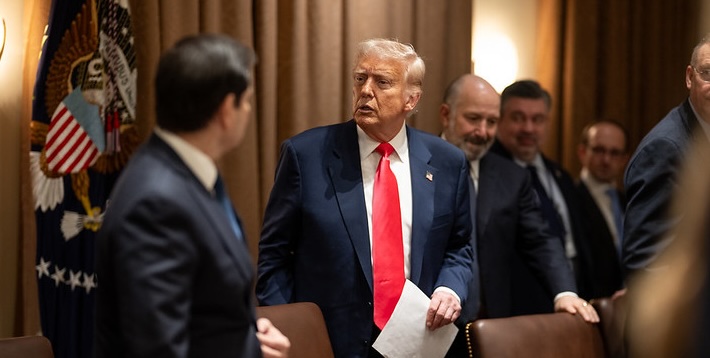Already a subscriber? Make sure to log into your account before viewing this content. You can access your account by hitting the “login” button on the top right corner. Still unable to see the content after signing in? Make sure your card on file is up-to-date.
President Trump has announced that US talks with Iran over the weekend made “very good” progress, despite mixed messaging coming from Iran.
Some shit you should know before you read: If you’ve been following along, the US-Iran nuclear talks are pretty touch-and-go, swinging unpredictably between cautious optimism and open hostility from week to week. One moment, negotiators hint at progress behind closed doors; the next, top Iranian officials like Supreme Leader Ayatollah Ali Khamenei publicly dismiss the talks as futile, criticizing the United States over “nonsense” demands to halt uranium enrichment entirely. Both sides claim to defend their red lines, which basically consist of Iran insisting it will never stop enrichment, while the US maintains that Iran must stop enrichment. Currently, Iran is enriching uranium at 60% purity, a level far beyond the civilian threshold and just a short technical leap from weapons-grade 90%, raising alarms in the US, Israel, and among European allies. EU officials have grown increasingly skeptical, privately saying that Iran is dragging out negotiations to advance its program and shorten its nuclear “breakout time.”

What’s going on now: While speaking to reporters yesterday, President Trump expressed optimism about the ongoing nuclear negotiations with Iran, stating that the US had engaged in “very good” talks over the weekend and hinting that positive developments could be announced within days. Though Trump did not elaborate on specific outcomes, he emphasized that “serious progress” had been made and said he had a “feeling” that something good might soon come from the process. The discussions mark the fifth round of indirect negotiations between the two countries, held in Rome and mediated by Oman.
Iranian officials also described the Rome talks as constructive. Foreign Minister Abbas Araghchi called it “one of the most professional rounds” of negotiations and said that Iran had clearly communicated its position. Despite the positive tone, significant disagreements remain—particularly over Iran’s uranium enrichment program. The United States continues to demand a full halt to enrichment, which it views as a pathway to nuclear weapons capability. Iran, however, insists that enrichment is a sovereign right and non-negotiable, reaffirming its intention to continue its nuclear activities “with or without a deal.”
Iranian Foreign Ministry spokesperson Esmail Baghaei further ruled out any interim agreements or temporary freezes on enrichment, countering recent media speculation. President Masoud Pezeshkian echoed this stance, asserting that Iran can survive renewed sanctions if no deal is reached, and warning that negotiations aimed at limiting Iran’s rights would fail.







